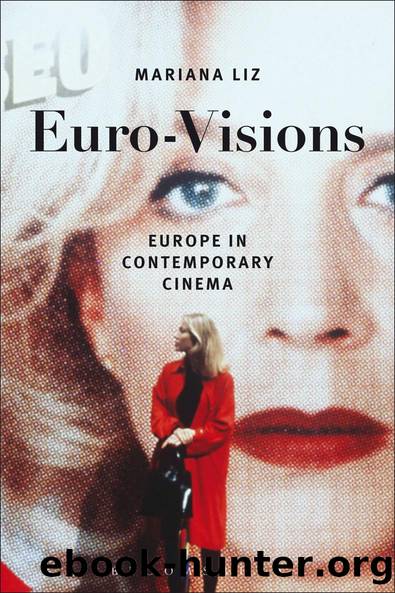Euro-Visions: Europe in Contemporary Cinema by Mariana Liz

Author:Mariana Liz [Liz, Mariana]
Language: eng
Format: epub
Tags: History, Europe, General, Performing Arts, Film, History & Criticism
ISBN: 9781628922998
Google: 7xHADAAAQBAJ
Goodreads: 22857005
Publisher: Bloomsbury Academic
Published: 2015-07-30T00:00:00+00:00
Alternative histories: Fantasy in post-war Europe
In films depicting the more recent history of the continent, Europe is also framed as a political construct. In addition to a new wave of committed and politically engaged filmmaking that has resurfaced in recent years â gaining new momentum after the euro-zone crisis of 2009 and the harsh austerity measures that were implemented as a consequence in a number of southern European countries â many films thematically explore the political turbulence the continent has experienced since the post-war era. Released through MEDIA distribution schemes, films such as The Dreamers, which describes the events of May 1968 in Paris through the eyes of a young American, and 4 luni, 3 saptamâni si 2 zile/4 Months, 3 Weeks, 2 Days (Cristian Mungiu, 2007), which looks at Romania under the CeauÅescu regime, are part of this trend. The distinction between Left and Right, the threat of terrorism and concerns about state security, as well as the legacy of totalitarian regimes, are key issues, albeit not exclusively, in contemporary Europe. By making these issues visible, and questioning their belonging to a shared European heritage or inheritance, the films examined here offer yet another perspective about the link between past and present, as well as this connectionâs relevance for the meaning of the idea of Europe.
Italian cinema constitutes a particularly fruitful case study of European filmâs engagement with politics. While in Italy this engagement dates back to at least the neorealist movement, politics has been a central theme for many films produced in the country in the twenty-first century. Examples include The Best of Youth, Mio fratello è figlio unico/My Brother Is an Only Child (Daniele Luchetti, 2007) and Il Divo â films featured, for instance, in the May 2010 issue of Sight and Sound, which was especially dedicated to the new Italian political cinema.
Good Morning, Night, also an Italian film and featuring in the MEDIA âclipsâ, is another key example of the cinematic treatment this topic has received. The film is also particularly useful for my discussion as it continues the questioning of history introduced by Black Book and pushes it further by representing an alternative version of history on screen. At the same time, it offers fundamental insight into the tension between Europe and the nation, as well as the definition of European cinema. As an auteurist, self-reflexive film, Good Morning, Night calls attention to the way in which the filmâs narrative is constructed. For example, the title is matched, within the film, by the title of a screenplay written by one of the characters. Crucial here is the distinction between fiction and reality, as well as the attention given to the different layers that compose the filmâs narrative.
Good Morning, Night narrates the kidnapping of Aldo Moro (Roberto Herlitzka) by the Marxist-Leninist revolutionary group Brigate Rosse (the Red Brigades) in 1978. Other recent European films have approached the issue of terrorism, including Tiro en la Cabeza/Bullet in the Head (Jaime Rosales, 2008) and GAL (Miguel Courtois, 2006),
Download
This site does not store any files on its server. We only index and link to content provided by other sites. Please contact the content providers to delete copyright contents if any and email us, we'll remove relevant links or contents immediately.
Naked as Nature Intended by Pamela Green(451)
The Filmmaker's Guide to Creatively Embracing Limitations: Not Getting What You Want Leading to Creating What You Need (for True Epub) by Pace William & Stobbe Ingrid(445)
30 Movies to Get You Through the Holidays by Roger Ebert(418)
Bond, James Bond by Brad Gilmore(386)
It's Only a Movie! by Haberski Jr. Raymond J(354)
The Making Of Horror Movies by Jennifer Selway(330)
How To Write A Novel The Easy Way Using The Pulp Fiction Method To Write Better Novels: Writing Skills by Jim Driver(312)
Chinese films in focus II by Unknown(311)
Smartphone Cinema: Making Great Films with Your Mobile Phone by Bart Weiss(310)
The Fellowship of the Knits: Lord of the Rings: The Unofficial Knitting Book by Tanis Gray(308)
Charles McGraw by Alan K. Rode(289)
Film Truth; November, 1920 by Anonymous(287)
Thomas Mann and Friedrich Nietzsche: Eroticism, Death, Music, and Laughter by Caroline Joan Picart(286)
The Greatest Show on Earth by Jerry Pinto(284)
The Romanian Cinema of Nationalism: Historical Films as Propaganda and Spectacle by Onoriu Colăcel(268)
Jurassic Park and Philosophy by Watkins Jessica Michaud Nicolas(263)
The Garden in the Machine by Unknown(259)
Jafar Panahi: Interviews by Unknown(257)
The Reel Truth by Reed Martin(257)
